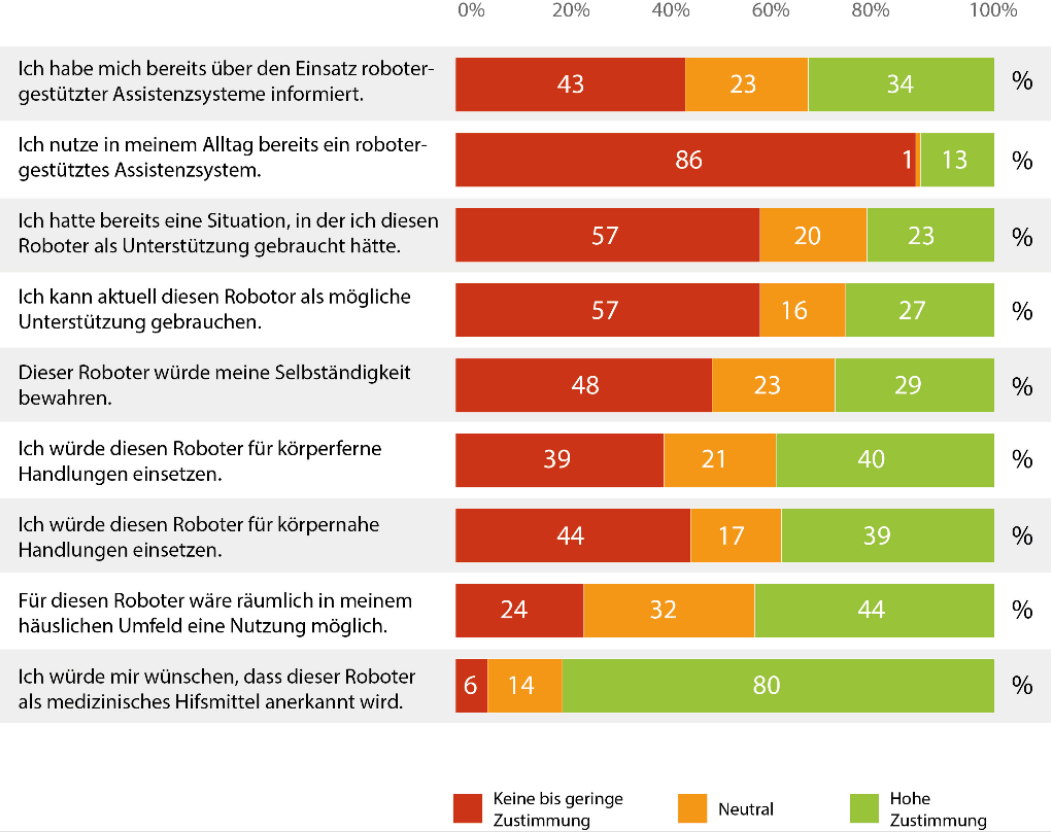People with ALS Wish for More Robotics in Care
Due to functional impairment, people with Amyotrophic Lateral Sclerosis (ALS) have a high need for nursing care and complex assistive devices provision. The targeted use of robotics – or robotic technology – may contribute to enhancing patient autonomy and relieving caregivers in their daily routines. In this light, a team of experts in the Ambulanzpartner network has been working for the employment of enhanced robotic assistance systems in ALS.
Researchers studied the acceptance of enhanced robotic assistance systems in patients with ALS and, in November 2018, presented the exciting results at the Annual Congress of the German Neurological Society (Deutsche Gesellschaft für Neurologie, DGN) and subsequently engaged in a discussion with the expert audience. We would share the content here in our newsletter with all our readers in the Ambulanzpartner network that might be interested in this topic.
Acceptance of Robotics in ALS Care
The study systematically analyzed acceptance of enhanced robotic assistance systems from the user perspective of ALS patients. Special attention was given to the fundamental openness displayed by patients towards robotic technology and, more particularly, acceptance of a semi-automatic robotic arm to support patient care.
The Study `Robotics in ALS Care´
The study was developed as a so-called prospective cohort study and realized from August to October 217. Subject of the study were patients diagnosed with ALS. Data capturing took place via the Ambulanzpartner care and research platform (www.ambulanzpartner.de). Technological readiness was measured using the Neyer short scale (2012). Furthermore, a multidimensional questionnaire especially developed to analyze acceptance of this robotic arm among patients was applied. This questionnaire came along with a video introducing the robot arm ALS severity was ascertained using the extended ALS Functional rating Scale (ALSFRS-extended).
Results of the Study
89 ALS patients participated in the survey (see table). Technological readiness ranked high (top third with 49 out 60 points). There was no significant difference between women and men (47 vs. 49 points) and age groups.

35% of the respondents (n=30) stated they had already gathered information on the use of general robotic assistance systems.
13% (n=11) were already using them in their routine activities (e.g. service robots). The personal situation of 23% (n=20) of the respondents was such that they wished for robotic assistance in their daily care. 26% (n=23) would currently profit from a robotic arm.
40% (n=34) could envisage using a robotic arm for actions performed away from their body (i.e., the passing of objects), 38% (n=32) could also envisage using such a robotic device to attend to their own body (e.g. for scratching).
The vast majority of patients (80%, n=67) felt it was necessary to establish enhanced robotic assistance systems as prescription devices.
 Fig: Acceptance of robotic arms, 6-item Likert scale, Source: Ambulanzpartner
Fig: Acceptance of robotic arms, 6-item Likert scale, Source: Ambulanzpartner
The Study Demonstrated the Patients’ Wish for Robotics to Enhance Patient Autonomy and Support Caregivers
Most ALS patients interviewed are fundamentally open towards technological devices and feel positive about using technological assistance systems. Seen from the user perspective, there is currently a need to use a semi-automatic robotic arm in care, primarily to maintain patient autonomy and to support caregivers. The majority of the respondents deem it necessary to employ a semi-automatic robotic arm as an assistive device in nursing care
The results of this study give us some guidance information on the future employment of robotics in patients with ALS. Enhanced robotic assistance systems can be of great help when it comes to facilitating patient participation in daily activities and patient autonomy
The study was supported by the German Federal Ministry of Education and Research (Bundesministerium für Bildung und Forschung, BMBF) in the context of the ROBINA (
www.projekt-robina.de) project.


